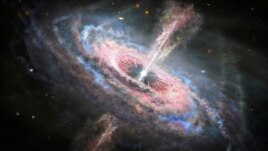10 July 2023
A team of scientists has observed time moving slower than usual in quasars of the early universe. This effect is known as "time dilation."
Quasars are some of the brightest things in the universe and scientists use them as "clocks" to keep track of time in the past. They are created by extremely large black holes, many times more massive than the sun, often in the center of galaxies. Black holes take in matter by gravitational pull and release radiation. That release is a quasar.
The scientists studied the brightness of 190 quasars that existed about 1.5 billion years after the universe was created. They compared the brightness of those quasars to some that exist today. They found that some movements that happen over a specific amount of time now, were five times slower back then.

This artist's concept shows a galaxy with a brilliant quasar, a very bright, distant and active supermassive black hole, at its center. (NASA, ESA and J. Olmsted (STScI)/Handout via REUTERS)
Famous scientist Albert Einstein proved that time and space have been growing in all directions since the start of the universe.
Scientist Geraint Lewis is an expert in astrophysics at the University of Sydney in Australia. He led the study, which appeared in the publication Nature Astronomy. Lewis said the expanding universe is why time flowed slower billions of years ago.
However, time did not feel like slow motion. If you were sent back in time, a second would feel like a second. But a second would take five times as long for a person today.
Lewis said: "In modern physics, time is a complicated thing."
Scientists had reported time dilation from 7 billion years ago by studying supernovas, the explosions of huge stars at the end of their life. Over time, the light created by supernovas disappears. Scientists studied explosions from billions of years ago and saw that they happened much slower then compared to now.
We cannot see individual exploding stars from a set distance away, so scientists are not able to study the early universe that well. Quasars are much brighter, so scientists are able to observe the activity from much further away and deeper in the past.
"What is observed over time is the quasar brightness. This fluctuates up and down, the result of lots of complicated physics in the disk of matter spinning around a black hole at almost light speed," Lewis said.
I'm Dominic Varela.
Reuters reported this story. Dominic Varela adapted the report for VOA Learning English.
_________________________________________________________
Words in This Story
galaxy – n. any of the very large groups of stars and associated matter that are found throughout the universe
specific – adj. clearly and exactly presented or stated
astrophysics – n. a branch of astronomy dealing especially with the behavior, physical properties, and dynamic processes of celestial objects and phenomena
complicated – adj. consisting of parts intricately combined
fluctuate – v. to be constantly changing especially up and down
spin – v. to turn or cause to turn round and round quickly